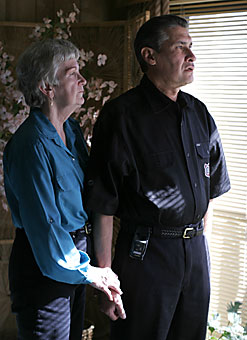 |
|
EVAN CARAVELLI/Arizona Daily Wildcat
|
Eugene Martinez, shown here with his wife Bobbie in their home in Green Valley, was the recipient of University Medical Center's 700th heart transplant. Since 1979, UMC has established a survival rate for its heart-transplant patients 7 percent above the national average.
|
|
|
By Jennifer Amsler
Arizona Daily Wildcat
Tuesday, January 18, 2005
Print this
Eugene Martinez considers himself a walking miracle.
Days after receiving the 700th heart transplant at University Medical Center in late December, Martinez, 55, was walking around his townhouse in Green Valley, something he was not expecting after such a major surgery.
"I feel like a teenager again," Martinez said.
He received his new heart Dec. 28 after nine hours of surgery, which Martinez said went smoothly.
"The beauty of it was I wasn't hooked up to any devices," he said. "I was a sick puppy but I didn't look like one."
However, his recovery is not complete. Martinez said he takes medications, which he probably will have to take for the rest of his life, so his body will not reject the new heart.
Martinez said he was grateful to have the support of his family and the UMC staff in his time of need.
"The staff have done wonders for me," Martinez said. "I can't overemphasize how professional and helpful they were to me."
Martinez learned he had a heart condition after he collapsed and was rushed to a hospital five years ago while shopping for a car in New Mexico.
Doctors performed triple bypass surgery and were able to stabilize him, Martinez said. They told him he would need a heart transplant because he suffered from ischemic cardiomyopathy, a condition that affects nearly 1 percent of the U.S. population.
The hospital brought in Martinez's family and were unsure if he would survive, he said.
"I was surprised because I was very healthy before that," Martinez said.
Martinez said he decided to move from his home in El Paso, Texas, to Arizona after being told about UMC's excellent reputation and high success rate for heart transplants.
One year after patients at UMC receive a heart transplant, their chances for survival are 92 percent, which is 7 percent higher than the national average, according to the United Network for Organ Sharing.
Martinez said he moved to Green Valley so he could be near UMC when he received a positive donor.
"I wanted to survive," Martinez said. "I didn't have a choice."
Dr. Francisco Arabia, who led Martinez's surgery, said Martinez is well on the road to recovery.
Arabia said and he was proud to perform UMC's 700th heart transplant, even though he did not find out about the milestone until after the surgery was completed.
"I didn't know that was the case until two days later," he said.
Arabia, the assistant professor of surgery, said he has performed about 100 heart transplants since his arrival at UMC in 1993.
Performing operations that save lives has been rewarding over the years, Arabia said.
"A lot of patients can go back and live a normal life," he said. "Some go on to have children, and others have gone back to work full time."
Since learning of his life-altering condition, Martinez found comfort in how the UMC staff bent backward to make his stay as accommodating as possible.
"They did a super job," Martinez said. "I had a team that wouldn't quit."
Since Arizona's first heart transplant, Arabia said research continues so UMC can give patients the best care possible.
"A lot of new ideas have been developed," Arabia said.
Jack Copeland, chief of cardiovascular and thoracic surgery and co-director of the Sarver Heart Center, began UMC's heart transplant program in 1979. Only five other transplant programs in the nation existed at the time.
Today, UMC continues to pioneer in research and health care for their patients.
Copeland made history Oct. 18 when he announced the artificial heart he helped create was the first to be approved by the Food and Drug Administration.
